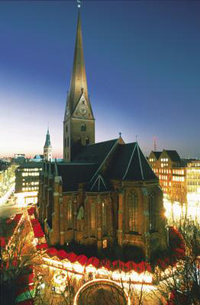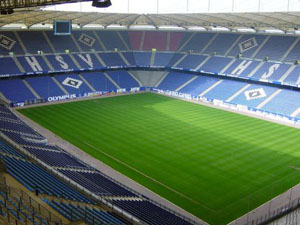
Germany 2006 FIFA World Cup VenuesFIFA World Cup Host Cities - HAMBURGHamburg city profile
Hamburg's seaport is one of the world's seven largest container ports, and, in terms of surface area, it is the largest seaport in Europe. The port, and the 80,000 people who work there, are a distinguishing feature of Hamburg. The city on the Elbe and Alster rivers is also one of Germany's major media centres. The German press agency dpa is located here, and 15 of the 20 highest-circulation German magazines are published in Hamburg. The city is also internationally renowned as Germany's foremost centre for musical productions, especially for musicals by Andrew Lloyd Webber such as "Cats" and "The Phantom of the Opera". Hamburg is the location of the International Maritime Law Court, and of more consulates than any other city in the world, representing 100 countries. Major sporting events are held in Hamburg throughout the year, and it is not unusual for the entire city to be on its feet. At the Hanse Marathon, for example. An elegant array of four-legged creatures competes neck and neck at the show-jumping, at polo tournaments, and at horse racing and trotting. In late summer, Hamburg's streets are given over to cyclists racing in the HEW Cyclassics. The international tennis world has its sights on "Rotherbaum" and the Hamburger SV and FC St. Pauli football teams can be relied on for staging hair-raisers every week. Hamburg's sporting activities have something for everyone. Each city district has several pitches and indoor facilities for the "traditional" types of sports such as football, handball, tennis and hockey. There are golf courses on the outskirts of the Hanseatic city and, of course, Lake Alster and the River Elbe are excellent for water sports enthusiasts. Yachting, rowing, kayaking, canoeing and even surfing clubs with good training facilities can be found here. Major Events at the Hamburg Stadium
Hamburg stadium profilePopulation: 1.7 million
Work on the new ground started in March 1998: the old Volksparkstadion was demolished in four stages, the pitch rotated and the stands rebuilt. The function rooms, VIP and media areas were completely remodelled. All the spectator areas are now covered. Electronic access controls featuring machine-readable microchip technology were introduced for the 2005-6 season. The stadium is home to Hamburg SV, the only club ever-present in the German top-flight throughout the Bundesliga's 42-year history. The old Volksparkstadion was reconstructed in 1953 on the debris and ashes of the previous arena. Germany suffered one of their most painful defeats here when Jürgen Sparwasser's goal sealed a 1-0 triumph for the former East Germany at the 1974 FIFA World Cup finals. However, the cloud had a silver lining as West Germany thus avoided a play-off against the powerful Brazilians, and went on to lift the FIFA World Cup trophy for the second time in their history. Financing: (*) "Total Seating Capacity" means the Gross Capacity less the seats unavailable for use due to restricted views and security/contingency reserves for the 2006 FIFA World Cup. This capacity is estimated and may change once these deductions are finally determined.
|
|||||||||||||||||||||||
Recommended Sportsbook
Bookmaker Sportsbook is a recognized sports betting leader since 1985. BookMaker provides safe, legal, and secure betting on major sporting events, as well as horse racing, casino, and poker entertainment, from any location in the world, 24 hours a day 7 days a week. Bookmaker is the number one legal online sports betting and entertainment center of America. Bonded and fully licensed by the Government of Costa Rica. With a reputation like this everyone should have an account.
Bookmaker covers all needs for any real gambler. If you do not have an account with Bookmaker you are making a very big mistake. Signing up now is better than ever as gives you the best bonuses available. With an array of bonuses and the best reputation, Bookmaker is a must have for A list sportsbook betting fans. Sign up today!
 Hamburg was founded under the name "Hammaburg " in 811, during the lifetime of Charlemagne. The granting of customs and commerce privileges in 1189 marks the beginning of Hamburg's ascent as a global centre of commerce. As one of the first members of the medieval Hanseatic League ("Hansa"), Hamburg was the League's principal trading port on the North Sea. Kings and princes have never reigned in Hamburg: Since the Middle Ages, it has been a city republic self-governed by its own citizens. Hamburg, which today is one of the 16 states of the Federal Republic of Germany, has always strongly defended its autonomous statehood.
Hamburg was founded under the name "Hammaburg " in 811, during the lifetime of Charlemagne. The granting of customs and commerce privileges in 1189 marks the beginning of Hamburg's ascent as a global centre of commerce. As one of the first members of the medieval Hanseatic League ("Hansa"), Hamburg was the League's principal trading port on the North Sea. Kings and princes have never reigned in Hamburg: Since the Middle Ages, it has been a city republic self-governed by its own citizens. Hamburg, which today is one of the 16 states of the Federal Republic of Germany, has always strongly defended its autonomous statehood.  The new stadium in Hamburg, inaugurated on 2 September 2000 with a match between Germany and Greece, boasts a capacity of 56,114 for Bundesliga matches. The arena officially qualifies as one of the best football grounds in Europe after earning a maximum five stars from UEFA.
The new stadium in Hamburg, inaugurated on 2 September 2000 with a match between Germany and Greece, boasts a capacity of 56,114 for Bundesliga matches. The arena officially qualifies as one of the best football grounds in Europe after earning a maximum five stars from UEFA.